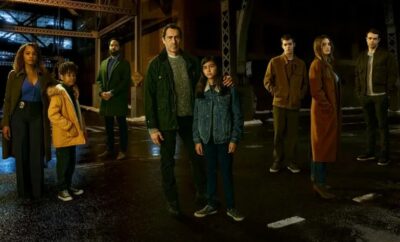Features
Good Girls Revolt – The Newser
By: Kathryn Trammell
“Good Girls Revolt” opens on the streets of New York where Patti Robinson (Genevieve Angelson) is making her way to work at News of the Week. According to the men who work with her, Patti’s identifier is her long blonde hair, which they use to describe her to the new girl, Nora Ephron (Grace Gummer). It is Nora’s first day of work as a researcher for the magazine. Setting the tone of both the show and Nora’s new workplace, Patti explains the dynamic between the researcher’s pit and the reporter’s bullpen as such: “They’re reporters. We’re researchers. We report, investigate and write files for the reporters. They do a pass on them, put their names on them and then the stories go to press.” While the “we” she speaks about does include men, the “they” she’s referring to never includes women. But it doesn’t keep staff members like her from doing their jobs to the fullest.
This being said, Nora’s first job is to help a researcher named Gabe (Teddy Bergman) develop a story about the indictment of Charles Manson, but when he refuses to work with her Nora looks elsewhere for some other purpose besides the menial one with which she’s been tasked. Like a whirlwind of enlightenment, she floats through the halls of the office and manages to befriend the quiet and docile caption author, Cindy (Erin Darke), who has been allotted one year to work at the magazine while her husband finishes law school. At the end of the year, it is expected that Cindy will quit her job in order to take on the more serious task of childrearing, which may happen sooner rather than later given that her husband has pricked a hole through her diaphragm.
Nora also helps to point out the irony behind Patti’s competition with another female researcher who has been given the researching lead on a story about a riot and stabbing that occurred at the Ultima Music Festival. She tells Patti that fighting with Jane (Anna Camp) is akin to two inmates fighting over the bottom bunk in jail – it’s all about “who gets to make the guys writing the story look better.” Nora’s words seem to make a light bulb flicker inside Patti’s mind, but it doesn’t turn on just yet.
It does, however, allow her to work better with Jane and she soon spends the entire night researching a discrepancy in a police report from the music festival that was signed by an officer who never even attended Ultima. She reports her findings to Finn (Chris Diamantopoulos), the manager of the magazine, who applauds her efforts by saying to her, “Atta girl,” which becomes a form of condescension when it isn’t coming from a secretary.
Digging deeper, Patti is able to find and contact a backup singer in California who was at the festival and who witnessed the riot and the stabbings. The singer tells Patti that the “hippy fans” weren’t responsible for the riot at all, which is what has been widely and falsely reported since the riot first occurred. Instead, it was the Hell’s Angels that were hired as crew and security for the event by the bands themselves who were responsible. This explains why the police reports were forged. The police were never at the event because they were not hired for it and the county hosting the festival is trying to keep this fact hidden from the public – only Patti was able to uncover it.
Patti relays the information from her anonymous source to Jane and Jane’s partner, Sam (Daniel Eric Gold). They deliver Patti’s research to Finn. Still confused as to why the bands would hire an outlaw gang as security for their event instead of the police, Finn goes into the researcher’s pit where Patti works to pick her brain a little bit more. She tells him that the bands hired the Hell’s Angels because they didn’t trust the cops. Music festivals are about love and peace, or at least they were supposed to be until the riot happened. Moreover, sometimes in order to reach a higher plain of peace and love one has to partake in the occasional recreational drug. Since cops would arrest the first person they saw carrying a bag of weed, the Hell’s Angels were hired instead. Simply put, the bands couldn’t trust the cops, but it seems they also couldn’t trust the Hell’s Angel’s to keep everyone safe as well.
When Jane and Sam update Wick (Jim Belushi), the veteran reporter tasked with overseeing the Ultima riot story, about their anonymous source he says they cannot use her because anonymous sources are unreliable and non-credible. While his refusal to allow them to use Patti’s source throws a wrench in their progress, it also makes Jane look especially bad for trusting Patti to deliver such vital information to her. In order to knock her down a few rungs and to remind her what his definition of “real” journalism is (certainly a woman couldn’t find a better source for a story than a man could) he asks Jane to retrieve him some coffee as if she were his secretary and not a staff researcher. Sadly, she knows exactly how he takes it.
While Jane is defeated after her meeting with Wick, Patty isn’t ready to give up so easily. Her source may not be willing to go “on the record” over the phone, but Patti thinks if she can talk to her in person she may be able to get her to agree to offering the magazine her name as a primary source. The only thing stopping her is money – specifically money to buy a plane ticket to California. She asks Jane to do this for her by using her dad’s credit card to make the purchase. “We’re too close to give up now,” she says to Jane, who eventually caves and delivers the plane tickets via Nora who intercepts Patti while she is shopping for gloves for her date that night. Before she leaves for the airport, Patti asks Nora to deliver a message to her boyfriend, Doug (Hunter Parrish) – a staff researcher just like her – that Patti is too sick to join him on their date.
In San Francisco, Patti meets with Danielle (Rebecca Naomi Jones), the backup singer who has been supplying her with information. Unfortunately, because Danielle wants to protect her career, she still refuses to be named as a source in Patti’s research. Patti asks Danielle if she knows of anyone else who could have seen what she saw the day of the Ultima riot – someone who would be willing to supply their name for the magazine. Danielle sends her to the house of Lucy Henderson (Lena Hall), a groupie whose obscure form of artistry has turned her living room into a gallery of plaster-cast phallic conquests. Lucy is ready and willing to bet her Jim Morison cast that “Mr. Mustache” is the killer. It’s not the best line of information, but Lucy is willing to be named and stories have been published with far less reliable information than this. So, Patti returns to her office to deliver her report to Finn.
Wick overhears as Patti and Jane try to convince Finn to run with the story, namely that he is only averse to trusting their sources because both are women without clout. Wick tells Finn he’d be crazy to run the story. To everyone’s surprise, Finn ignores Wick and allows the story to run anyways.
Before Patti has time to revel in her success, Doug quickly reminds her that her success wasn’t worth standing him up for their date last night. She had a responsibility to meet him, and she chose her career over him. While her decision to stick with the story leaves him stomping away from her like a child who’s been refused desert at the dinner table, it causes Nora to invite Patti to a “consciousness meeting.” The details of the meeting are left vague although we know it must be rightfully feminist given the nature and tone of the show.
In Finn’s office, Wick and Finn meet to discuss the Ultima piece, which Wick says is irrelevant given their need to cover the Vietnam War. Finn disagrees. He tells Wick that counter-culture movements like riots are just as important as mainstream news and that if his magazine is going to stay afloat among competitors like Time and Rolling Stone he needs to start giving stories like the Ultima riot the space to be featured in his magazine as well.
As if to emphasize his point better – that real journalism involves mainstream news stories and not the counter-culture crap that Finn all of sudden subscribes to – Wick descends into the research pit to applaud the work of the reporter who recently turned in the article on Manson’s indictment calling it “bullseye reporting.” As he speaks, he pats Gabe’s back, believing him to be the reporter responsible for the piece until Nora steps forward to tell him that she stole Gabe’s piece from Wick’s desk after it was delivered and rewrote it before submitting back to his desk. The declaration captures the attention of everyone in the pit and the bullpen and in a matter of seconds Wick’s demeanor completely changes: his smile fades to smugness, his posture straightens and his nose lifts into the air to make sure he looks down on Nora although they are nearly eye to eye. Women don’t complete rewrites on articles he says to Nora. That’s not how journalism works. If it did, then credit for a piece would have to be given to a woman and equating “woman” with “reporter” is something Wick’s world of journalism isn’t ready to do.
So, Nora quits. While we hope that maybe Patti or even Jane will follow her out the door Jerry McGuire style, something far more powerful happens. Rarely does a TV show set up a scene in which the intentional juxtaposition of two incredible forces symbolize something so significant, but “Good Girls Revolt” did just that when every woman inside the office rushes to Nora’s desk below the bullpen to ask her what she will do next. She tells them very plainly that she will go somewhere else where she can actually write and walks out of the office as every women watches her from the research pit and every man watches her from the reporter’s bullpen. Literal space might separate the sexes from meeting in this moment, but one woman’s ability to revolt just forced them closer to collision.





You must be logged in to post a comment Login